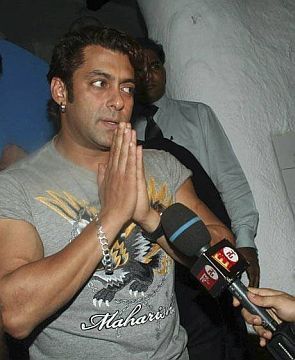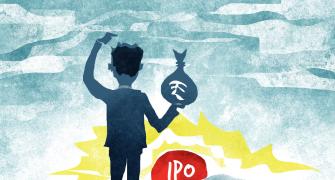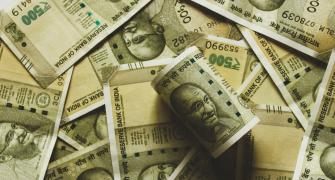 Bollywood actor Salman Khan's lawyer on Saturday accused the prosecution of cooking up a false story that he ran away from the spot after his car rammed into a bakery in suburban Bandra killing one person and injuring four others on September 28, 2002.
Bollywood actor Salman Khan's lawyer on Saturday accused the prosecution of cooking up a false story that he ran away from the spot after his car rammed into a bakery in suburban Bandra killing one person and injuring four others on September 28, 2002.
"Khan was very much present at the spot for quite some time as revealed by the prosecution witnesses," defence lawyer Shrikant Shivade said in his final argument before the sessions judge D W Deshpande.
Witnesses said that after the mishap, Khan was standing there for 5 to 10 minutes and then he left, said Shivade.
Shivade also referred to the evidence of defence witness Ashok Singh, Khan's family driver, who said that the actor stayed on the spot with him for quite some time.
The defence lawyer also rejected the prosecution's claim that Khan absconded after the mishap and was not found at his home.
"Khan was very much present at his residence in Galaxy Apartments in Bandra," said Shivade, referring to the statement of Chinky Pandey, car dealer and brother of actor Chunky Pandey, who had sold the car to Khan.
Pandey had visited Khan's house in the morning (after the mishap) between 9 am and 9.30 am and was with him, he said.
Moreover, as stated by Ashok Singh it was he (Singh) who was driving and not Khan so there was no reason for the actor to run away, the lawyer said.
Shivade also relied on the statement of Khan's friend and neighbour Francis Fernandes who said he separated the actor from the mob at the accident spot.
Some of them were carrying rods while others held stones in their hands, and he advised Khan to go away in a car, which Fernandes's wife drove, the lawyer said.
Salman is facing the charge of 'culpable homicide not amounting to murder'. The judge on Saturday said that arguments should end by Monday, when he would be fixing the date for pronouncement of verdict.
Advocate Shivade also contended that the court should discard the evidence of eye-witness and Khan's police bodyguard Ravindra Patil, the complainant in the case. Patil passed away during the trial.
When police reached the spot and asked Patil about the accident, he kept quiet. An FIR was lodged later, he said.
"Patil has alleged that Khan was under the influence of liquor and was driving the car. Being a policeman, he knew that drunken driving was a serious offence. Why did he not disclose to police Khan's role when they first inquired about the mishap?" Shivade said, adding that this non-disclosure by Patil would render the subsequent FIR illegal.
In view of the aggravated charge of culpable homicide not amounting to murder being added, prejudice was caused to the defence because Patil is no longer available for cross-examination.
Therefore, his earlier testimony should not be accepted and the charge of culpable homicide should be dropped, he argued.
Patil disclosed for the first time in the magistrate's court that Salman was drunk, which he had not said in the police statement earlier, Shivade said.
"Our case is that he (Patil) was sleeping in the car when the mishap occurred. He is not even aware of the route taken by the person driving the car. He cannot be believed," said the lawyer.
The Alister Periera case cited by the prosecution was completely different (where a car had run over those sleeping on the pavement) because in Khan's case, witnesses had said that there was no footpath and the road extended up to the steps of the bakery, he said.
There was a heated argument between the defence lawyer and the prosecution on the use of technology in the court, as Shivade brought a TV to the courtroom to show the route which Khan's car had taken on the night of the mishap.
The defence lawyer also showed a clip to show a truck veering off to the left after its tyre burst. The defence's case is that in the present case the accident happened because a tyre of the car burst.
However, special prosecutor Pradeep Gharat questioned the purpose of using the video. Shivade said he was not adding this as evidence, but the purpose was to explain the circumstances to the court.
"Then I should also be given a chance to show a video...let there be video vs video," Gharat said.
"You could have done so...who prevented you," Shivade retorted.
When Gharat requested the judge D W Deshpande to allow him to "show videos", Shivade said: "The time for that is over...you have submitted final arguments."
Shivade argued that the prosecution story of Khan driving at a speed of 90 to 100 km per hour and suddenly taking a right turn at a junction was a figment of imagination because in that case the car should have veered to the right.
The car's left front tyre burst and as a result it veered to the left side and the driver lost control. It was a sheer accident and it cannot be said that an offence was committed, Shivade argued.
Driver Ashok Singh, who claimed he was driving the car, was a true and natural witness and his version should be believed, the defence lawyer argued.







